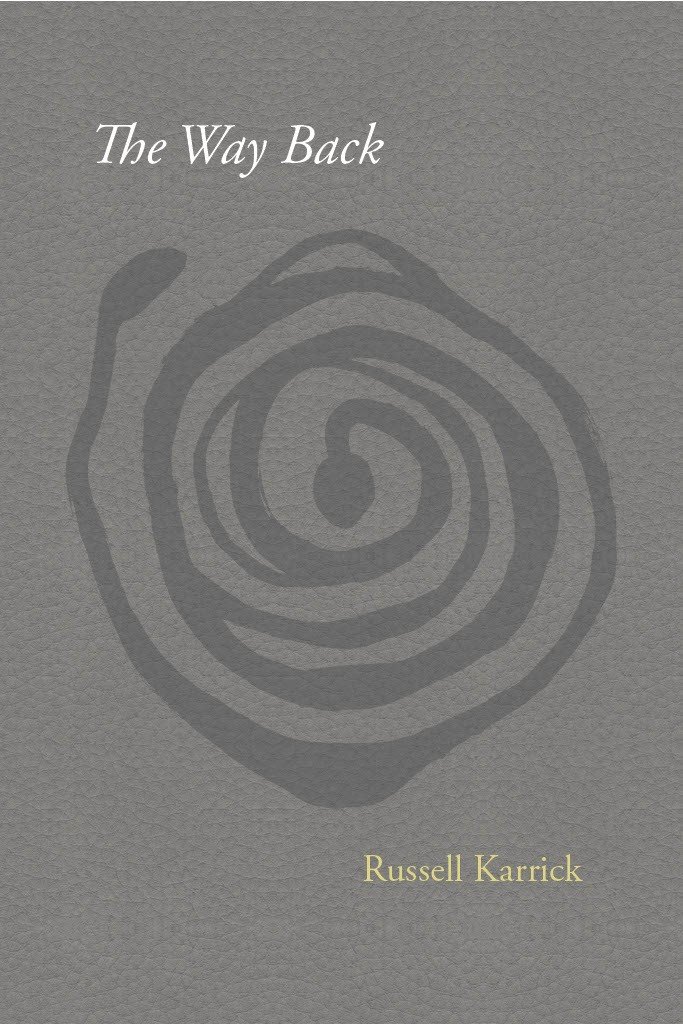Barrelhouse Reviews: The Way Back by Russell Karrick
Reviewed by Emily Light
Slapering Hol Press / March 2024 / 21 pp
“Three days since the full moon, and it hasn’t waned.” Magical realism and mixed metaphors abound in South American poetry, forming an alternate reality from the observed world. Russell Karrick, a New York native and a current resident of Colombia, draws on this poetic tradition in his debut chapbook, The Way Back, to illustrate a complex journey toward healing. There is, from the first poem to the last, a layering of time: a present-tense man searches human society and the natural world for redemption from past errors. Even as he discovers peace, he never allows himself to forget this is a parallel search: that a better future inherently includes acceptance of past mistakes, potentially including mistakes made in the present tense. Further, the collection acknowledges nature’s dichotomous beauty and horror, and compares that two-sided coin to humans’ own.
Just as life exists within a central gray area, Karrick never lets his speaker off easy. “Salvation is a horse / I’ll live inside of / in some other life,” Karrick writes in his penultimate poem, “Tethered.” This dream-like unity can only happen for him, however, when he no longer has “thoughts / as careless as these.” The impossibility of perfection, the small horrors of daily life, live in every poem, yet this does not negate the beauty, hope, and joy Karrick finds in this world. His speaker begins in pain, adorned in a “scarf / of frost” and “claw[ing] at the wounds / below [his] skin,” yet he is not alone. In “Ceremony,” two dead pigs are lit on fire and an artist has gone missing. “Across the Border–Venezuela to Colombia” includes a man weaving paper money into cheap sculptures while a mother sells her hair for her and her child’s survival. Where one American man’s quest in South America could easily become internal and self-obsessed, Karrick immediately places his speaker within a larger whole, establishing him as one broken man with perspective.
Once in Colombia, the speaker’s present begins taking shape into a journey back to a better self. He realizes the “air is once again / good for breathing,” after which his new lover tells him,
the sky,
bleeding at its edges,
is the inside of a ripe plum.
Even if nature often functions within his poems as a benevolent and healing force, he doesn’t view nature as a transcendent, single-faceted goodness. The speaker bleeds; the sky bleeds; but love reframes the pain into the sweetness of summer fruit. Not long after, he has a vision of himself as
Botero’s bird, Pájaro de Paz, whole and untroubled,
perched next to its mangled twin.
Such gorgeous imagery pervades Karrick’s poems. His present-self and past-self coexist in this allusion incongruously.
Yet the interconnectedness of nature and man highlight life’s potential for beauty within this collection. In a loveless affair, the speaker “invite[s] the sparrows…to fill the small gaps / between her body and [his].” Birds have further power, in “Hungry Sparrow,” to “translate…sorrow into song.” In “Green Mangos,” one mango tree allows the speaker to make blessings for his unborn son with every leaf. Another mango tree feeds his pregnant partner. Guava after guava, all of which spectacularly contain his missing teeth, connect the speaker with his dead grandmother, a guitarist, a polar bear, and his dreams.
The natural world he discovers within Colombia has all the resources he needs to find what he seeks. Again, in “Green Mangos,” he reflects,
It rains almost every afternoon,
but our tin roof gives each drop
a bright voice.
It seems the way back for Karrick is a matter of allowing for beauty in every moment, even in what he might initially find irritating or ugly. As his speaker discovers this in Colombia, marriage, and fatherhood, he also begins to discover it within himself.
Rather than glorifying the subjects that bring his speaker joy, such as love, children, and nature, Karrick provides a realistic portrait of each. He includes “black ants marching off” with pieces of dead cucarrones in the same poem as his son, “eight months old / and teething, more monster / than man.” He sees fish as “songs full of hunger,” his son both as “a gopher” and a “petite / prince,” his pregnant wife as wolf-like while eating apples. Even though he calls himself “the drunken / father who drinks to forget / the shame of drinking,” he leaves sonnets for his wife “in sugar bowls.”
This revelation finds its apex in “Love Is,” when the speaker acknowledges the love for his wife and son are “the way to & / back from here” a conclusion that comes after the sort of juxtaposition that understands life’s inherent dichotomies: even a “succulent peach” has a pit large enough to choke the eater.
By book’s end, the moon that once remained full for three days “is not yet / a moon.” The speaker whispers in his son’s ear while they walk through Colombia’s perpetual green. The poetic moon never truly waned, though. Rather, that moon traded some of its original pain for wonder: a son with an instinct his father lost long ago, who knows to pluck “the only red fruit among the leaves” of a guava tree.
Emily Light is a poet, educator, and mother living in northern New Jersey. Her poetry can be found in such journals as Inch, Salt Hill, Cherry Tree, terrain.org, and RHINO, among others.

